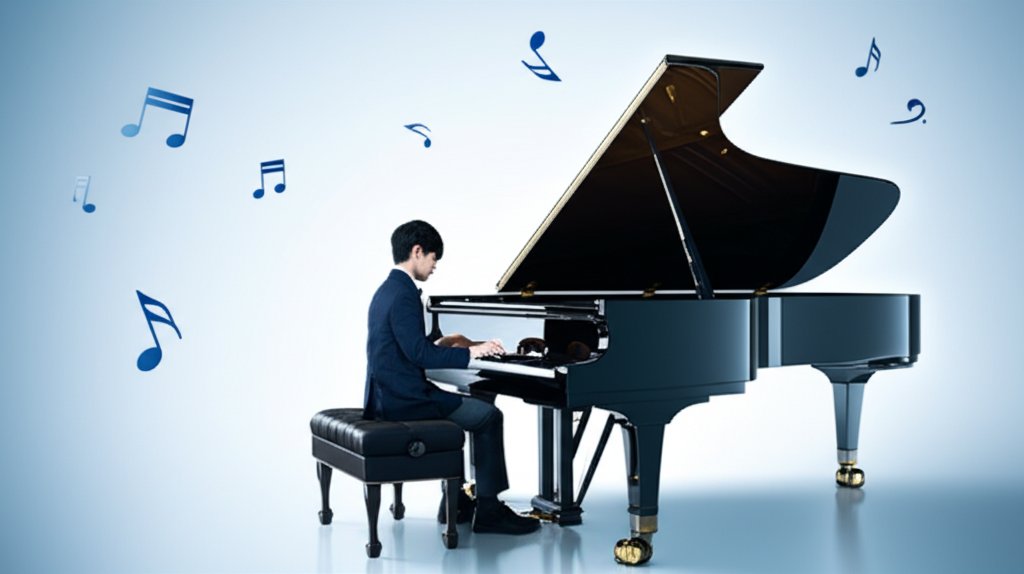The calendar is filling up, and the world’s stages—both physical and virtual—are preparing. The circuit of piano competitions for youth 2025 is shaping up to be one of the most accessible and diverse yet, offering young pianists a powerful platform to showcase their talent, gain invaluable feedback, and connect with a global community. This isn’t just about winning a prize; it’s about marking a new chapter in your artistic journey.
But with so many options, from prestigious international events to innovative online contests, how do you choose the right stage to step onto? The key is moving from a mindset of chance to one of strategy.
At a Glance: Your 2025 Competition Strategy
- Understand the Landscape: Discover how the rise of hybrid and online formats creates new opportunities for young pianists.
- Choose with Purpose: Learn a framework for selecting competitions that align with your current skill level, artistic goals, and repertoire.
- Spotlight on Key Events: Get a closer look at specific 2025 competitions, from the multi-stage San Francisco International to specialized European contests.
- Navigate the Deadlines: A practical timeline to guide your preparation, from research and recording to performance.
- Build Your Repertoire: Understand how repertoire choices can make or break your application.
- Answers to Your Questions: Get clear, direct answers to common concerns about prestige, cost, and the value of competing.
The 2025 Landscape: A Mix of Tradition and Innovation
The world of piano competitions has evolved. While legacy names like the Chopin and Van Cliburn competitions remain pinnacles of achievement, the landscape for emerging artists is richer and more varied than ever. Organizations like the World Federation of International Music Competitions (WFIMC) and the European Piano Teachers Association (EPTA) continue to set high standards, but the real story for 2025 is accessibility.
We’re seeing a solidified hybrid model, where online preliminary rounds open the door to a global talent pool, reducing the initial financial barrier of travel. The San Francisco International Piano Competition is a prime example for 2025, offering online and in-person regional auditions before its finals. This approach allows you to test the waters and gain experience without the immediate cost of an international flight.
Simultaneously, fully online competitions based in Greece, Spain, and Turkey are gaining traction, judged by respected international juries. These events offer a fantastic way to get performance feedback, build your artistic CV, and compete from your own home or studio.
How to Choose Your Stage: A Strategic Framework
Entering a competition without a strategy is like playing a piece without studying the score. You might get through it, but you won’t deliver a compelling performance. Your first step is an honest self-assessment.
Assess Your “Competition Readiness”
Technical proficiency is the price of entry, but it’s rarely what distinguishes the finalists. Judges are listening for musicality, interpretation, and a deep understanding of the piece’s structure. This is where your command of accompaniment patterns and harmonic language becomes your secret weapon. Developing the skills to shape a phrase, voice a chord with intention, and drive rhythmic momentum is fundamental. If you’re looking to build that core musicality, a comprehensive framework can help you Unlock Piano Comp Mastery and turn your technical skills into true artistry.
Once you have a clear picture of your strengths, you can match them to the right event.
Align Your Goals with the Competition Type
Not all competitions serve the same purpose. Ask yourself: what do I want to achieve this year?
- To Gain Experience? Look for festivals or competitions with masterclass components or detailed feedback rounds. The 3rd Ankara International Piano Competition & Festival is a great example.
- To Win a Major Prize? Target events with significant cash awards and performance opportunities, like the San Francisco competition, which offers over $20,000 in prizes.
- To Specialize? If you excel in chamber music, focus on dedicated events like the «Renzo Giubergia» Award in Italy for violin/viola/cello and piano duos or the Luigi Nono International Chamber Music Competition.
- To Build a Network? In-person competitions in hubs like New York, Manchester, or San Francisco provide unparalleled opportunities to meet peers, jurors, and artistic directors.
Decode the Details: Age, Repertoire, and Deadlines
This is where the fine print matters. Create a simple chart for your top choices to compare key details side-by-side.
| Competition Example | Age Focus | Format | Key Feature |
|---|---|---|---|
| San Francisco Int’l Piano Comp. | Young Artists (4-18) | Hybrid | Strong US presence with regional hubs. |
| Rencontres Int’l des Jeunes Pianistes | Up to 24 years old | In-Person (Belgium) | Specifically targets “young pianists.” |
| Heida Hermanns Int’l Music Comp. | 18-30 years old | In-Person (USA) | Ideal for older youth/young adults. |
| 1st Festival Prize Online Comp. | All ages | Online | Global accessibility, lower entry barrier. |
| Pay close attention to repertoire requirements. Some competitions demand a specific etude, a piece from a certain period, or a work by a national composer. Ensure your program is not only polished but also fully compliant with the rules. |
A Spotlight on Key 2025 Youth Competitions
While dozens of competitions are open, a few stand out for their structure and focus on young artists. Here are some to watch as you plan your year.
- For the Aspiring Global Performer: San Francisco International Piano Competition
- Dates: June – August 2025 (Finals Aug 4-13)
- Deadline: May 15, 2025
- Why it Matters: Its hybrid structure is perfect for a first international attempt. You can audition online or at a regional hub in Boston, San Francisco, or New York. The dedicated “Young Artists” category (ages 4-18) ensures you’re competing against your peers, and the finals at the San Francisco Conservatory of Music offer a world-class performance experience.
- For the European-Focused Pianist: 17th “Rencontres Internationales des Jeunes Pianistes”
- Dates: November 18-23, 2025
- Location: Grez-Doiceau, Belgium
- Why it Matters: This competition’s name says it all: an international meeting of young pianists. With an age limit of 24, it’s tailored for students and early-career artists. An in-person European competition offers deep cultural immersion and networking opportunities within the continent’s classical music scene.
- For the Versatile Musician: American Virtuoso International Music Competition
- Dates: February 2025 – August 2026
- Location: Washington D.C., USA
- Why it Matters: This isn’t just for pianists. Open to strings, vocals, and other instruments, it provides a festival-like atmosphere. It’s an excellent choice if you want to experience a broader celebration of music-making and meet talented peers from other disciplines.
- For the Digital Native: Online Competitions
- Examples: 1st Festival Prize (Greece), Sonikum (Spain), NextGen (Spain)
- Why they Matter: These competitions remove the logistical hurdles of travel and visas. They are judged on the quality of your submitted video performance, placing a premium on excellent recording technique. They are a fantastic way to get your name in front of an international jury and receive feedback at a fraction of the cost of a traditional tour.
Your Practical Playbook: A 2025 Competition Timeline
Success is about deliberate preparation. Break your year down into manageable phases.
Phase 1: Research & Repertoire (Now – March 2025)
Your goal is to move from a long list to a shortlist of 2-3 target competitions.
- Action: Consult comprehensive resources. The Alink-Argerich Foundation (AAF) publishes an indispensable guide that details deadlines, jury members, and rules for hundreds of competitions.
- Action: Finalize your repertoire. Choose pieces you love and can perform confidently under pressure. Ensure your program is versatile enough to meet the requirements of your top-choice competitions.
Phase 2: Application & Recording (April – June 2025)
This is the administrative push. Be meticulous. - Action: Mark all deadlines in your calendar with reminders. The San Francisco competition’s deadline is May 15—don’t miss it!
- Action: If submitting video, book a high-quality recording session. A poor recording can mask a great performance. Treat it as a formal concert.
Phase 3: Refinement & Pressure Testing (July – September 2025)
With applications in, the focus shifts entirely to performance. - Action: Schedule mock performances. Play your full program for your teacher, family, friends, or at a local church or school. This helps you manage nerves and identify weak spots.
- Action: Record yourself during these mock concerts. Listening back is one of the most powerful tools for self-correction.
Phase 4: Performance & Logistics (October – December 2025)
This is it. Time to perform. - Action: For in-person events, book travel and accommodations well in advance. Arrive a few days early to acclimate and secure practice time.
- Action: For online submissions due in this period, do one final review of your recordings and submit them well before the deadline to avoid technical glitches.
Quick Answers to Common Questions
Let’s address some of the questions that might be on your mind.
Q: Are online piano competitions less prestigious than in-person ones?
A: Not inherently. Prestige is built by the quality of the jury, the history of the organization, and the caliber of the participants. While they offer a different experience, a win from a well-regarded online competition with a distinguished jury is a significant achievement to add to your biography.
Q: I’m 17. Which competitions are best for my age group?
A: Look for events with specific youth categories or age caps. The San Francisco competition’s “Young Artists” (4-18) is a perfect fit. The “Rencontres Internationales” in Belgium (up to 24) is another excellent option for your upper age range. Avoid those with a minimum age of 18, like the Heida Hermanns competition, for now.
Q: What if I don’t win? Was it a waste of time?
A: Absolutely not. The true value of a competition lies in the process. The discipline of preparing a demanding program to a deadline is a skill that will serve you for your entire musical life. The feedback from world-class jurors is priceless, and the connections you make with other passionate young musicians can last a lifetime. View it as a milestone, not a finish line.
Your Next Piece Is Your First Step
The landscape of piano competitions for youth 2025 is rich with opportunity. But opportunity requires action. Don’t feel overwhelmed by the sheer number of choices. The path to the stage doesn’t start with booking a flight; it starts with the work you do today at the keyboard.
Pick one competition from this list that excites you. Read its rules. Look at its required repertoire. Your journey for 2025 begins with that single, focused action. Select a piece, open the score, and begin the process of turning notes into a performance worthy of an international stage.
- Discover Affordable Singing Lessons Near Me to Unlock Your Potential - February 24, 2026
- Affordable Vocal Lessons Bring Professional Singing Guidance Within Reach - February 23, 2026
- Local Vocal Lessons Offer Expert Guidance for Every Singer - February 22, 2026










